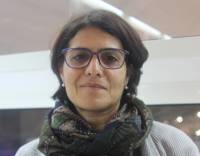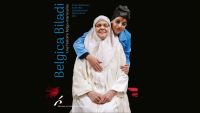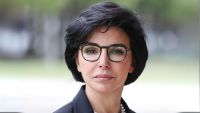“There are British Muslim girls who believe they will go to paradise if they marry a jihadist,” Souad Talsi tells me frankly. “Being married to a man who becomes a martyr gives her status. That dangerous view is reinforced by mothers who have been absorbed by a blanket fundamentalist Muslim mentality that has no bearing on the beliefs and cultures of their country or parents.
Thirty years ago Talsi, 53, a British Moroccan, founded the Al-Hasaniya Centre on Golborne Road in North Kensington, London. The centre receives funding from the Royal Borough of Kensington and Chelsea and Public Health England. It supports women of the local Arabic-speaking community. Its services cover mental health, domestic violence and assistance for both young women and the elderly.
Increasingly the growing threat of young people going to Syria is influencing Talsi’s work and that of her staff. She is deeply troubled by the numbers of young British men and women leaving for Syria. “Having helped support mothers of Moroccan and Arabic background to integrate better, we now face this strange challenge of trying to integrate British born and English-speaking children who seem to have lost their identity,” she says.
Of growing concern is the rising number of young girls leaving the UK for Syria. About 50 British women and girls are thought to have joined Islamic State with the majority based in the jihadists’ stronghold of Raqqa. A 15-year-old girl made headlines when she was removed from a plane by counterterrorism police who believed she was destined for Syria. This week the Study of Radicalisation in London reported that it had identified 30 British women in northern Syria who are using social media to encourage others to carry out atrocities at home.
Talsi stresses the need for a better understanding of why young people are turning their backs on their families, home and country to fight a war they don’t understand. “Policy shapers should know that what is happening abroad has a direct impact on these young people,” she insists.
As part of her work, Talsi has helped the broken families of young people who have travelled to Syria or who are considering doing so. Until last year Al-Hasaniya ran a Home Office-funded programme working with local mothers. Talsi halted funding because of pressure to deliver numbers, but the work continues. “For us it was the quality of our work that counted. Making a positive difference to one person’s life and outlook — and we’ve changed dozens — is a massive achievement. It takes time to do that properly.”
Talsi is at pains to stress that her prevention work is one aspect of her invaluable all-round contribution to the community. She does not want Al-Hasaniya to be known just for its work with these vulnerable youngsters, although she acknowledges that it is inevitable that as the problem becomes more serious this issue will take more of her focus.
Mohammed El-Araj, 23, killed fighting alongside Isis in Syria, and Amal El-Wahabi, sentenced to two years in prison for funding terrorism, were both from the local area. Owing to her strict confidentiality code, Talsi won’t be drawn on commenting on the impact on the families involved, but says this didn’t happen overnight. “I saw it coming years before the media reports. The parents who are affected are well-educated people who have worked hard to give their children a good start in life and teach them right from wrong. They are devastated by what’s happening and don’t know where to turn. Mothers wake up one day and find their child has gone to Syria. They have no idea they were planning this. That is why many are terrified their children might go too even though there is nothing to suggest they will.”
While most of us have difficulty comprehending how young girls especially would follow a radical path where they end up being controlled, Al-Hasaniya staff understand what drives them to risk their lives and associate with an increasingly violent group.
“Girls are raised with the very traditional and strict values that belonged to their parents’ countries back in the Sixties and Seventies,” explains Esma Dukali, 36, the centre’s manager and a British-born daughter of Moroccan migrants. “The countries themselves have moved on, but families living here haven’t necessarily. They continue to raise their daughters in a way that was acceptable 30 years ago. Even though they’re British, it’s difficult for these young women to reconcile their cultural upbringings with modern Western society and they’re confused about who they are. They turn to religion as a common connection, which is why there is more emphasis on religion now. Girls are being enticed into fighting a religious war under the umbrella of religious authority, which they believe gives them permission over everything else.”
“In cases where the mother hasn’t integrated, daughters are vulnerable,” agrees Talsi. “Girls are married off as young as 16. Often domestic abuse arises but many women don’t know how to have conversations about these issues with their daughters.” She cites the case of Nora El-Bathy, the 15-year-old French-Tunisian girl who fled her home in France for Syria, an act described by her brother “as the mistake of her life”, as just one example of how dangerous misconceptions are rife among young girls.
“While some wear the veil because they choose to exercise their autonomy, others believe that wearing the veil is compulsory or they are forced to wear it by their husbands,” Talsi explains. “It restricts their work opportunities and isolates them. It is not Islamic. Those wearing the veil are often the most vulnerable in society and they are inadvertently influencing their children. Our approach is to promote education, to better understand religious responsibilities and to make the point that when one does the pilgrimage to Mecca, the veil must be removed. There needs to be a clear demonstration that this is a cultural and not religious habit.”
The Al-Hasaniya centre bustles with activity. Every day women of Moroccan and Arabic heritage, from North Africa to the Far East, go through its doors to meet, chat, play music and eat couscous. Al-Hasaniya means “doing good” and the centre is a social hub for women who would otherwise be in their homes. They receive counselling, legal advice and English and IT lessons in a female-only environment where they feel comfortable enough to remove headscarves and veils.
The impact was strongly felt here when British-born Yusuf Sarwar was sentenced to 12 years and 8 months in prison after travelling to Syria “to do jihad”. “The reason for a collective anguish wasn’t just over the harsh sentence but because this young man was arrested after his mother, Majida, went to the police to report her son,” Talsi says. “The police are encouraging affected parents to voice their concerns to them and this mother felt she was doing the right thing. Unfortunately the case has pushed many more mothers back into their homes just as they were being persuaded to come out and speak about their fears. They know they can come and talk with us about their fears and suspicions.”
Dukali says: “In these cases we first support the mothers, the most highly regarded member of Muslim families. We may enlist the help of a local imam who shows young people the true meaning of Islam as told in the Koran, which teaches tolerance. Community elders take on the role of a father-figure if one is absent. We make clear that we are bound by our duty to report cases which are at risk to the individual or wider community. I have only had to report one case.”
Al-Hasaniya works closely with local services, councils, police and government-funded Prevent teams as a “pre-criminal space”. This is considered to be the time when an individual may be thinking of going to Syria before a crime has been committed. “It is in this period that our most effective work can be done,” Dukali says. “Our young people see injustice and want to help but we show them there is much we can do together in a united, peaceful way, such as supporting the charities who are making a difference to the lives of the people of Syria.
“We tell them they don’t understand the situation until they get out and have no idea who they’ll be joining forces with. There’s a strong possibility of them not coming back. Anyone considering going just has to think about the mother of one young man from here who died in Syria. She was only told he was buried, but not where or how he died. She explained to us the feeling of having her heart being physically ripped from her. The pain she endures day to day is indescribable. We can only hope that these terrible cases will provide lessons and prevent others from following. It shatters families and communities.”
Talsi says: “Youngsters are exposed to graphic images of how Muslims are suffering. Gaza is a potent example which has had an impact on young people concerned with human rights. I tell young people if they want to make a difference then make it through the ballot box or by volunteering for a charity or doing a meaningful job. 9/11 changed the shape of our society. There is mistrust, and a balance needs to be struck.
“During a Prevent-funded programme, one young veiled woman, extremely angry and antiestablishment, managed through our support to see a new, positive way forward and re-evaluate her judgment. She continued with further education and joined a local political party in order to be effective.”
In 2010, Talsi, who chose to use her law degree for the advancement of multicultural communities, was awarded an MBE for her invaluable contribution to society. She couldn’t have foreseen then how five years on she would be dealing with this new crisis — the exodus of third-generation British Muslims intent on fighting a war of terror. Media reports have highlighted a significant percentage of Syrian-bound youngsters hailing from London’s North Kensington district where Talsi herself grew up after arriving in the UK in 1972, aged 12.
She recalls how different the area was when she was a child. “No one felt the need to parade their religious orientation. You didn’t see women wearing the veil. I’ve always worn my veil in my heart. I am first and foremost British of Moroccan descent, but I am also Muslim. I live Islam, but I don’t have to talk about it. My father came here on a work visa in the Sixties. He told me and my three brothers who we were but at the same time he wanted us to embrace our new country.
“We lived in a house in Ladbroke Grove opposite a convent. I would go next door to give Mrs Smith her Christmas card. I’d happily go to assembly with the Christian girls in school. I knew that didn’t make me Christian but Islam teaches tolerance of other faiths and cultures. There was no Islamaphobia then. Now the area is a pressure cooker.”
Talsi observes “an angry generation which has suffered from a lack of opportunities and guidance” and says: “Living in large housing estates with limited access to youth facilities and little or no help from the outside has resulted in a moral vacuum. They’ve led a very different childhood from we second-generation British. They’ve been drip-fed hatred and dangerous rhetoric for years by people like Abu Hamza whom most moderate Muslims feel should have been stopped long before he started influencing our younger generation. A very dangerous situation has been allowed to evolve.
“These young people don’t have a distinct identity,” she continues. ‘They’re lumped together as Muslim and as a result are losing sight of their individual culture heritage. A Moroccan in West London is very different from a Pakistani in Birmingham or a Saudi in Knightsbridge. Islam is part of an identity, but not everything. We’re constantly being told about the failure of Muslims in schools. That’s like talking about the blanket failure of Catholics or Church of England pupils. Their futures are being written off before they have a chance to prove themselves. It’s a self-fulfilling prophecy. Syria has given them a warped sense of purpose. Part of our work is to give them a positive one.”
Talsi says it’s not government spin-doctors that are needed but work at grassroots level, “from the bottom up”. She explains: “When I was young I’d see the local bobby cycling up and down Portobello Road. I’d always stop to talk to him. He’d go round to families’ houses for tea and soon enough they’d be telling him how so and so did this and so and so did that, unwittingly giving him crucial information needed to prevent crime in the community. The police themselves say they are stretched and that impacts on what we are seeing today.”










